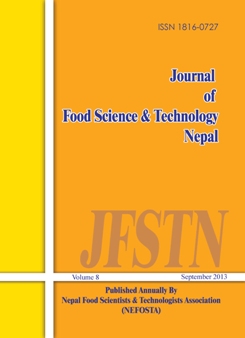Effects of Mild Ingestion of Used Fried Rapeseed Oil (Mustard Oil) on Hepatic Tissues in Long-Evans Rats
DOI:
https://doi.org/10.3126/jfstn.v8i0.11756Keywords:
Mild ingestion, rapeseed oil, hepatic effect, serum indices, long-evans ratsAbstract
Rapeseed oil (mustard oil), the commonly used cooking oil in rural areas of Bangladesh, contains serucic acid (22:1 n-9) that causes harmful effects to human health. The study was conducted on Long-Evans rats to observe the hepatic effect mustard oil. The first group rat used as control fed with flour, while experimental groups 1 and 2 were treated with fried mustard oil (2g flour + 9 g oil daily) and erucic acid free mustard oil (2g flour + 9 g oil daily) respectively for 5 weeks. Serum indices for three hepatic enzymes Aspartate Transaminase (AST), Alanine Aminotransferase (ALT) and Alanine Phosphatase (ALP), used as the indicator of hepatic activity were analyzed by Dade-Behring auto analyzer. Significant difference of AST, ALT and ALP activity was observed in control and group 2 with group 1. Therefore erucic acid of mustard oil has a toxic effect on the hepatic tissue.
DOI: http://dx.doi.org/10.3126/jfstn.v8i0.11756
J. Food Sci. Technol. Nepal, Vol. 8 (78-80), 2013
Downloads
Downloads
Published
How to Cite
Issue
Section
License
The author will be the copyright holder of this open access journal - 'Journal of Food Science and Technology Nepal (JFSTN)'.

